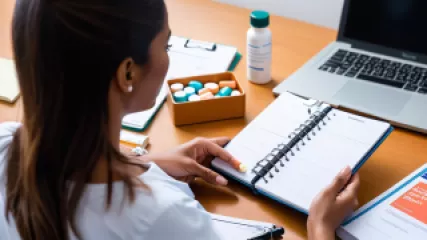How to Manage Psychiatric Medication: A Step-by-Step Guide
Welcome to our step-by-step guide on how to manage psychiatric medication. Taking care of your mental health is an essential part of overall well-being, and for many individuals, psychiatric medication plays a crucial role in their treatment plan. This guide will provide you with valuable information and practical tips to help you navigate the process of managing your psychiatric medication effectively.
1. Consult with a Mental Health Professional
The first step in managing psychiatric medication is to consult with a qualified mental health professional. Whether it's a psychiatrist, psychologist, or primary care provider, they will assess your symptoms and medical history to determine if medication is necessary. They will also prescribe the appropriate medication based on your specific needs.
2. Understand Your Medication
Once you have been prescribed psychiatric medication, take the time to understand what it is and how it works. Research the medication, its potential side effects, and any precautions or guidelines provided by your healthcare provider. Understanding your medication will empower you to make informed decisions and be proactive in managing your mental health.
2.1 Research the Medication
Start by researching the medication prescribed to you. Look up its name, generic name, and any alternative names it may have. Read about its purpose, how it interacts with your brain, and how it may alleviate your symptoms. Familiarize yourself with the common dosages and forms available.
2.2 Learn about Potential Side Effects
Every medication has potential side effects, and it is important to be aware of them. Research the common side effects associated with your medication, as well as any rare or severe reactions that may occur. Understanding the possible side effects will help you identify and manage them effectively.
2.3 Follow Precautions and Guidelines
Your healthcare provider will provide you with specific precautions and guidelines for taking your medication. This may include instructions on when and how to take it, whether it should be taken with food, and any substances or activities to avoid while on the medication. Adhering to these guidelines is crucial for the safe and effective management of your psychiatric medication.
3. Create a Medication Schedule
Establishing a medication schedule is essential for consistency and adherence. Work with your mental health professional to create a schedule that aligns with your daily routine and ensures you take your medication as prescribed. Set reminders on your phone or use pill organizers to help you stay on track.
4. Track Your Symptoms
Tracking your symptoms can provide valuable insights into how your medication is working for you. Keep a journal or use a mental health app to record any changes in your mood, sleep patterns, energy levels, or side effects. This information will assist your healthcare provider in adjusting your medication if needed.
5. Communicate with Your Healthcare Provider
Open and honest communication with your healthcare provider is crucial throughout the medication management process. If you experience any concerning side effects or feel that the medication is not effectively addressing your symptoms, reach out to your provider. They can make adjustments to your medication or offer alternative treatment options.
6. Engage in Therapy or Counseling
Psychiatric medication is often most effective when combined with therapy or counseling. These therapeutic interventions can help you develop coping strategies, address underlying issues, and learn valuable skills to manage your mental health. Consider incorporating therapy or counseling into your treatment plan for comprehensive care.
7. Stay Informed and Educated
Continuously educate yourself about mental health, psychiatric medication, and new developments in the field. Attend support groups, read reputable sources, and stay connected with mental health communities. Staying informed will empower you to be an active participant in your treatment and make informed decisions.
8. Practice Self-Care
Managing psychiatric medication can be a part of your overall self-care routine. Prioritize healthy lifestyle habits, such as regular exercise, sufficient sleep, stress management techniques, and a balanced diet. Engage in activities that bring you joy and help you relax. Taking care of your overall well-being will complement the effects of psychiatric medication.
9. Stay Consistent
Consistency is key when it comes to managing psychiatric medication. Take your medication as prescribed, follow your healthcare provider's instructions, and attend scheduled appointments. Consistent medication management will optimize its effectiveness and contribute to your overall mental well-being.
Remember, managing psychiatric medication is a collaborative effort between you and your healthcare provider. By following these steps and staying actively engaged in your treatment, you can effectively manage your psychiatric medication and take control of your mental health journey.






